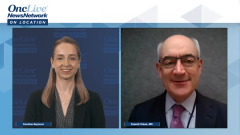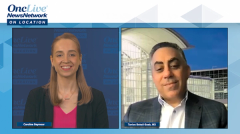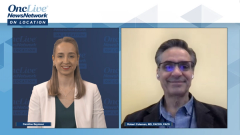
Gastrointestinal Cancers Recap at ASCO 2022: Dr Tanios Bekaii-Saab

OncLive® will be LIVE with OncLive® News Network: On Location at the 2022 ASCO Annual Meeting. Each day, we will broadcast a series of interviews with top thought leaders, to learn their thoughts and reactions to data presented across oncology during the conference.
OncLive® will be LIVE with OncLive® News Network: On Location at the 2022 ASCO Annual Meeting. Each day, we will broadcast a series of interviews with top thought leaders, to learn their thoughts and reactions to data presented across oncology during the conference.
Today-
We are reporting from the 2022 ASCO Annual Meeting!
Get ready for highlights of some of the top news presented each day during the meeting—and soon we’ll speak with Dr. Tanios Bekaii-Saab, on what pivotal gastrointestinal studies he is most excited about.
Welcome to OncLive® News Network! I’m Caroline Seymour.
In the phase 1b COSMIC-021 trial, the combination of cabozantinib and atezolizumab demonstrated promising clinical activity and a suitable safety profile as first-line therapy in patients with cisplatin- eligible and -ineligible, inoperable locally advanced or metastatic urothelial cancer and as second- or later-line therapy in those who received a prior immune checkpoint inhibitor.
The addition of maintenance avelumab to best supportive care demonstrated improved outcomes for patients with advanced urothelial carcinoma including those who went on to receive second-line therapy in an exploratory analysis of the JAVELIN Bladder 100 trial.
The use of panitumumab plus modified FOLFOX6 significantly improved overall survival in patients withleft-sided, RAS wild-type metastatic colorectal cancer compared with patients who received modified FOLFOX6, plus bevacizumab, according to findings from the phase 3 PARADIGM trial.
In patients with KRAS wild-type locally advanced or metastatic pancreatic cancer, nimotuzumab plus gemcitabine led to an improvement in overall survival and progression-free survival versus gemcitabine alone in the phase 3 NOTABLE trial.
Finally, guided approaches leveraging circulating tumor DNA status were shown to reduce the number of patients who received adjuvant chemotherapy without the risk of lowering recurrence-free survival rates for some patients with stage II colon cancer in the phase 2 DYNAMIC study.
Please be sure to check out more of our coverage from the 2022 ASCO Annual Meeting at OncLive.com.
That’s all for today. Tomorrow, we’ll virtually sit down with Drs Bradley McGregor, Robert Coleman, and Kevin Kalinsky, who will share their perspectives on the breaking research in genitourinary, gynecologic, and breast cancers.
Thank you for watching OncLive® News Network: On Location, I’m Caroline Seymour.







































